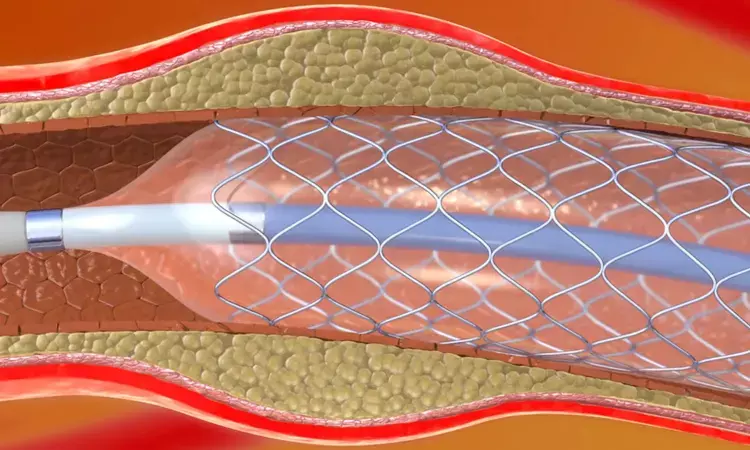- Home
- Medical news & Guidelines
- Anesthesiology
- Cardiology and CTVS
- Critical Care
- Dentistry
- Dermatology
- Diabetes and Endocrinology
- ENT
- Gastroenterology
- Medicine
- Nephrology
- Neurology
- Obstretics-Gynaecology
- Oncology
- Ophthalmology
- Orthopaedics
- Pediatrics-Neonatology
- Psychiatry
- Pulmonology
- Radiology
- Surgery
- Urology
- Laboratory Medicine
- Diet
- Nursing
- Paramedical
- Physiotherapy
- Health news
- Fact Check
- Bone Health Fact Check
- Brain Health Fact Check
- Cancer Related Fact Check
- Child Care Fact Check
- Dental and oral health fact check
- Diabetes and metabolic health fact check
- Diet and Nutrition Fact Check
- Eye and ENT Care Fact Check
- Fitness fact check
- Gut health fact check
- Heart health fact check
- Kidney health fact check
- Medical education fact check
- Men's health fact check
- Respiratory fact check
- Skin and hair care fact check
- Vaccine and Immunization fact check
- Women's health fact check
- AYUSH
- State News
- Andaman and Nicobar Islands
- Andhra Pradesh
- Arunachal Pradesh
- Assam
- Bihar
- Chandigarh
- Chattisgarh
- Dadra and Nagar Haveli
- Daman and Diu
- Delhi
- Goa
- Gujarat
- Haryana
- Himachal Pradesh
- Jammu & Kashmir
- Jharkhand
- Karnataka
- Kerala
- Ladakh
- Lakshadweep
- Madhya Pradesh
- Maharashtra
- Manipur
- Meghalaya
- Mizoram
- Nagaland
- Odisha
- Puducherry
- Punjab
- Rajasthan
- Sikkim
- Tamil Nadu
- Telangana
- Tripura
- Uttar Pradesh
- Uttrakhand
- West Bengal
- Medical Education
- Industry
Incremental rise in glycated hemoglobin in diabetics associated with Stent failure after PCI: Study

Researchers have found that poor glycemic control significantly increases the risk of stent failure in patients with type 2 diabetes (T2D) who have undergone implantation of second-generation drug-eluting stents (DES). The study, conducted in Sweden, highlights the critical role of maintaining optimal blood sugar levels to reduce complications associated with stent procedures. This study was published in the Journal of the American College of Cardiology by Irene Santos-Pardo and colleagues.
Type 2 diabetes is a prevalent condition that often requires the use of drug-eluting stents to manage coronary artery disease. However, the impact of glycemic control on the success and longevity of these stents has not been well understood. This study aimed to investigate whether poor glycemic control, as indicated by higher levels of glycated hemoglobin (HbA1c), is associated with an increased risk of stent failure, including in-stent restenosis and stent thrombosis.
The primary objective of the study was to determine the association between HbA1c levels and the risk of stent failure in T2D patients. The study sought to identify if patients with poor glycemic control were at higher risk compared to those with better-controlled blood sugar levels.
This observational study included all patients in Sweden with T2D who underwent implantation of second-generation DES from 2010 to 2020. The primary exposure variable was the updated mean HbA1c. Patients were stratified based on their HbA1c levels, with those having HbA1c between 6.1% to 7.0% (43-53 mmol/mol) serving as the reference group. The primary endpoint was the occurrence of stent failure, defined as in-stent restenosis and stent thrombosis. The main analysis was performed using a complete cases model, with sensitivity analyses conducted to account for missing data and the impact of death as a competing risk.
The study analyzed data from 52,457 individuals who received 70,453 DES. Among these, 24,411 individuals (29,029 DES) had complete data for analysis. The median follow-up period was 6.4 years. The hazard ratios (HR) for stent failure, fully adjusted for confounders, showed a significant increase with higher HbA1c levels. Specifically:
• HbA1c ≤5.5% (≤37 mmol/mol): HR 1.10 (95% CI: 0.80-1.52)
• HbA1c 5.6% to 6.0% (38-42 mmol/mol): HR 1.02 (95% CI: 0.85-1.23)
• HbA1c 7.1% to 8.0% (54-64 mmol/mol): HR 1.25 (95% CI: 1.11-1.41)
• HbA1c 8.1% to 9.0% (65-75 mmol/mol): HR 1.30 (95% CI: 1.13-1.51)
• HbA1c 9.1% to 10.0% (76-86 mmol/mol): HR 1.46 (95% CI: 1.21-1.76)
• HbA1c ≥10.1% (≥87 mmol/mol): HR 1.33 (95% CI: 1.06-1.66)
Sensitivity analyses confirmed these findings, indicating robust results across different analytical models.
The study clearly demonstrates that poor glycemic control is associated with a higher risk of stent failure in T2D patients, primarily due to in-stent restenosis. These findings underscore the importance of stringent glycemic control in patients undergoing DES implantation to enhance stent longevity and reduce complications.
The study concludes that poor glycemic control significantly elevates the risk of stent failure in T2D patients. This association highlights the necessity for rigorous monitoring and management of blood sugar levels in patients receiving drug-eluting stents. Ensuring optimal glycemic control could be a critical strategy to improve stent outcomes and reduce the incidence of in-stent restenosis.
Reference:
Dr Riya Dave has completed dentistry from Gujarat University in 2022. She is a dentist and accomplished medical and scientific writer known for her commitment to bridging the gap between clinical expertise and accessible healthcare information. She has been actively involved in writing blogs related to health and wellness.
Dr Kamal Kant Kohli-MBBS, DTCD- a chest specialist with more than 30 years of practice and a flair for writing clinical articles, Dr Kamal Kant Kohli joined Medical Dialogues as a Chief Editor of Medical News. Besides writing articles, as an editor, he proofreads and verifies all the medical content published on Medical Dialogues including those coming from journals, studies,medical conferences,guidelines etc. Email: drkohli@medicaldialogues.in. Contact no. 011-43720751


